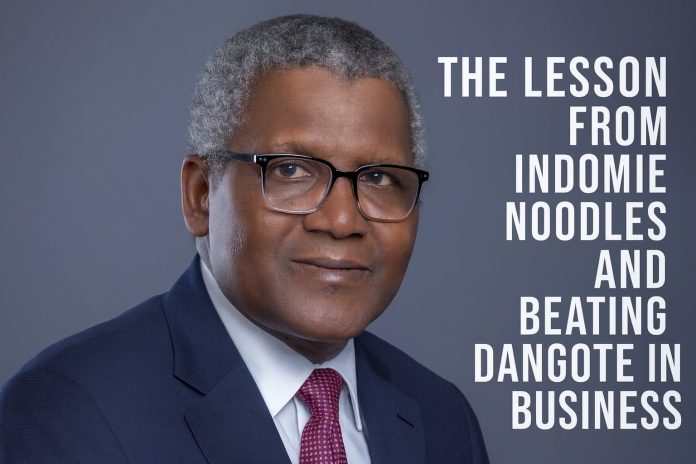By Ndubuisi Ekekwe
In the chronicles of African capitalism, few names command as much reverence as Aliko Dangote — a man who has built vast empires across industries, transforming the continent’s industrial landscape through scale, strategy, and vertical integration. From cement and sugar to flour and petrochemicals, Dangote’s playbook has been consistent and formidable: own the upstream, dominate the midstream, and control the downstream with relentless efficiency.
For decades, that model has delivered unbroken success. Yet, in one rare instance, the formula met its equal — and yielded a business lesson that remains timeless.
When the Dangote Group entered the instant noodles market, many observers believed the outcome was predetermined. With its unmatched control over production, energy, logistics, and workforce, the group seemed poised to replicate its dominance in yet another sector.
However, Dufil Prima Foods, makers of Indomie Noodles, had already fortified its own empire using the same principles that powered Dangote’s rise. Long before the entry of Dangote Noodles, Dufil had built deep capabilities across the value chain — from raw material processing to packaging and nationwide distribution.
In essence, Indomie had already “Dangote-fied” the noodles industry.
As a result, when the Dangote Group entered the market, it found no inefficiencies to exploit, no supply chain gaps to close, and no cost advantages to leverage. The master of vertical integration had finally met a peer who spoke the same industrial language — fluently.
In this rare duel, efficiency neutralized efficiency. Despite its strength in quality and pricing, Dangote Noodles could not dislodge Indomie from consumer preference or market share. Eventually, the Dangote Noodles business was sold — ironically — to Dufil Prima Foods, Indomie’s parent company.
The Lesson: Compete on Capability, Not Noise
The Dangote–Indomie episode underscores a profound business truth: in markets defined by deep industrial integration, true competition happens upstream, not in marketing slogans or price discounts.
To challenge an empire like Dangote’s, one must build equal or superior capabilities — control the inputs, master logistics, and ensure that every layer of production compounds efficiency rather than leaks it.
There is no shortcut. In industries where infrastructure, power, and production define competitiveness, brand storytelling cannot substitute for structural strength. Dufil did not out-market Dangote; it out-engineered him.
And so, for once, the master of vertical integration met his match — not in emotion or advertisement, but in systems, factories, and control.
That is the enduring lesson of modern competition:
You do not outshine a master by reacting; you rise to his level — or higher.




